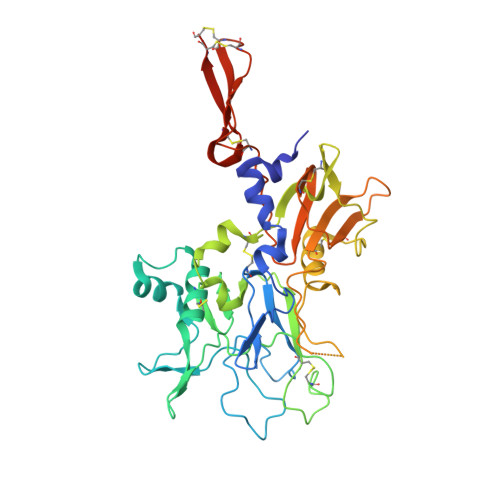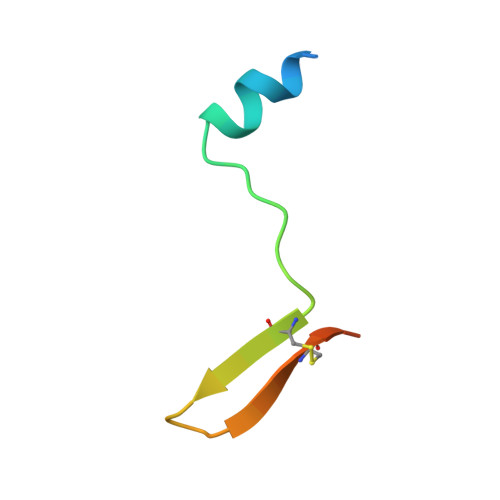Toxoplasma Gondii Sporozoites Invade Host Cells Using Two Novel Paralogs of Ron2 and Ama1
Poukchanski, A., Tonkin, M.L., Fritz, H.M., Treeck, M., Boulanger, M.J., Boothroyd, J.C.(2013) PLoS One 8: 70637
- PubMed: 23940612
- DOI: https://doi.org/10.1371/journal.pone.0070637
- Primary Citation of Related Structures:
3ZLD, 3ZLE - PubMed Abstract:
Toxoplasma gondii is an obligate intracellular parasite of the phylum Apicomplexa. The interaction of two well-studied proteins, Apical Membrane Antigen 1 (AMA1) and Rhoptry Neck protein 2 (RON2), has been shown to be critical for invasion by the asexual tachyzoite stage. Recently, two paralogues of these proteins, dubbed sporoAMA1 and sporoRON2 (or RON2L2), respectively, have been identified but not further characterized in proteomic and transcriptomic analyses of Toxoplasma sporozoites. Here, we show that sporoAMA1 and sporoRON2 localize to the apical region of sporozoites and that, in vitro, they interact specifically and exclusively, with no detectable interaction of sporoAMA1 with generic RON2 or sporoRON2 with generic AMA1. Structural studies of the interacting domains of sporoRON2 and sporoAMA1 indicate a novel pairing that is similar in overall form but distinct in detail from the previously described interaction of the generic pairing. Most notably, binding of sporoRON2 domain 3 to domains I/II of sporoAMA1 results in major alterations in the latter protein at the site of binding and allosterically in the membrane-proximal domain III of sporoAMA1 suggesting a possible role in signaling. Lastly, pretreatment of sporozoites with domain 3 of sporoRON2 substantially impedes their invasion into host cells while having no effect on tachyzoites, and vice versa for domain 3 of generic RON2 (which inhibits tachyzoite but not sporozoite invasion). These data indicate that sporozoites and tachyzoites each use a distinct pair of paralogous AMA1 and RON2 proteins for invasion into host cells, possibly due to the very different environment in which they each must function.
- Department of Microbiology and Immunology, Stanford University School of Medicine, Stanford, California, United States of America.
Organizational Affiliation:

















